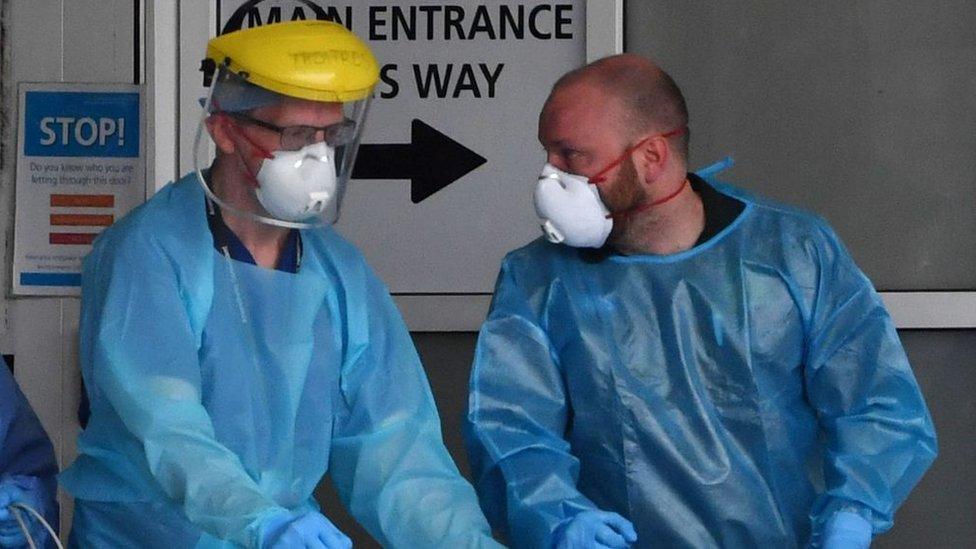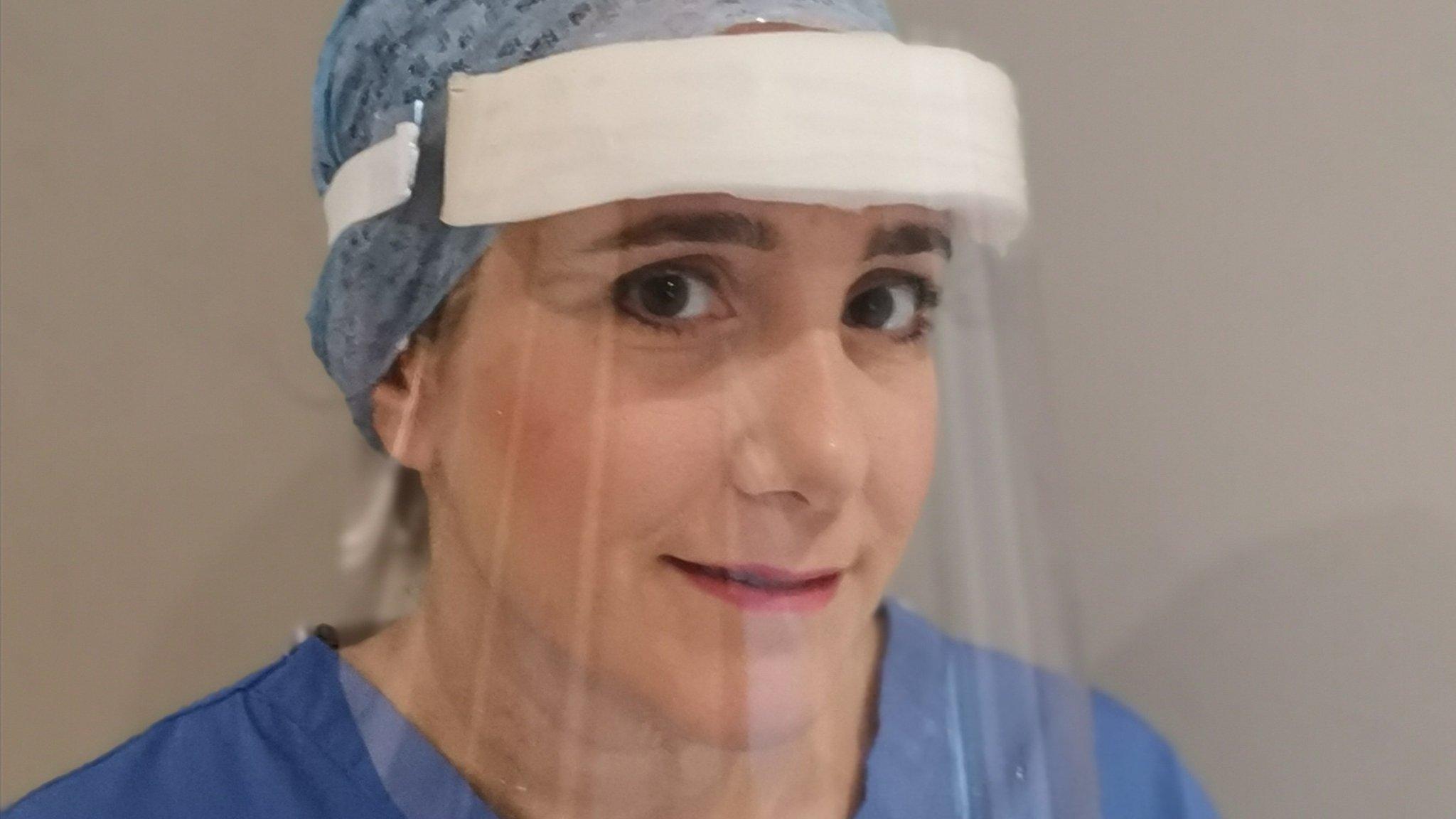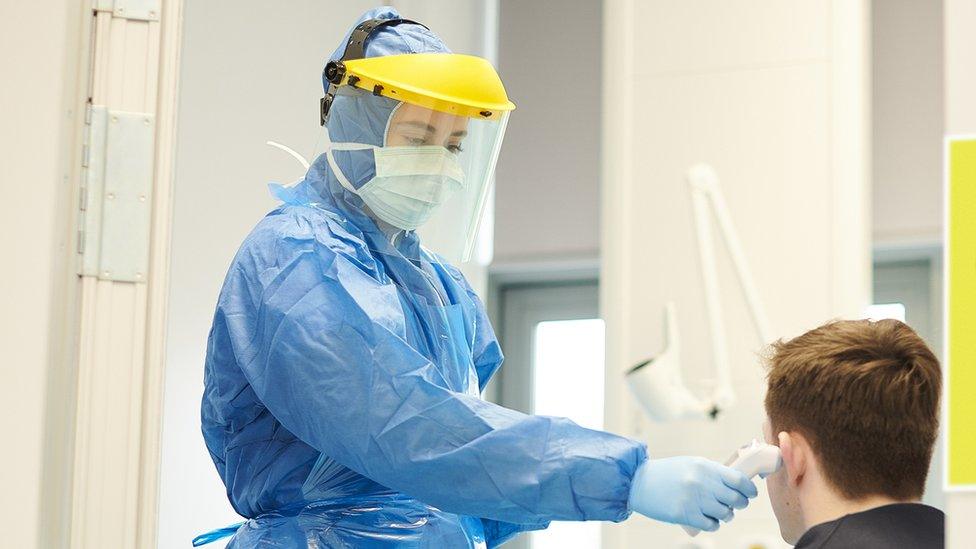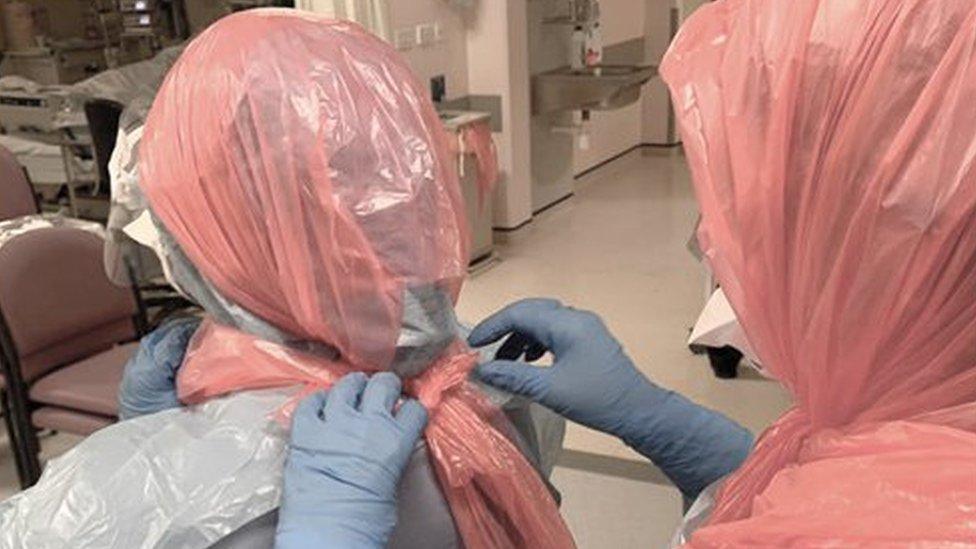Coronavirus: Doctors 'buy their own PPE or rely on donations'
- Published

Nearly two-thirds of doctors told the survey they are not well protected during the pandemic
Almost half of doctors in England might be buying their own protective equipment or are relying on donations, according to a survey by the British Medical Association (BMA).
The survey of more than 16,000 doctors also found that 65% feel they are only partly or not at all protected on the front line of the coronavirus crisis.
One said the situation is "an outrage for all staff".
The government said it is "working round the clock" to deliver equipment.
The survey found that 48% of doctors reported having bought personal protective equipment (PPE) directly for themselves or their department, or had received donations from a charity or local firm.
"At the moment we're at the mercy of donations or purchasing them," Dr Chaand Nagpaul, chairman of the BMA council, told BBC Breakfast.
"That doesn't give you security and it hasn't met the government's own commitment and promise that it will be protecting its workforce."
He said the survey showed supplies were improving but that they had not reached a point where all staff could be assured they would be adequately protected from infection.
GPs appear to be more affected by PPE shortages: 55% of family doctors said they had to source their own equipment, compared with 38% of hospital doctors.
'Our biggest fear"
Dr Helen Kirby-Blount is a GP at Riverside Health Partnership in Retford, Nottinghamshire. She told BBC News that the partnership has not received any PPE from the government since early March.
She said staff have resorted to buying their own PPE online, and are otherwise dependant on donations, including goggles and visors made by local schools.
Costs continue to rise, and there is no guarantee that staff will be refunded for equipment they have bought themselves.
Where practical, Dr Kirby-Blount said staff are are re-using equipment, but had so far avoided re-using aprons, gloves or surgical masks.
"We are not comfortable re-using masks," she said. "We would not normally do so in any other type of situation."
About five of her staff have frequent contact with patients who may have coronavirus, including patients in care homes and those referred by the 111 phone service. Dr Kirby-Blount said "the best PPE" is reserved for high-risk occasions.
She estimates current mask supplies will run out in 1-2 weeks.
Dr Kirby-Blount believes the situation is only likely to get worse as restrictions are lifted.
"We are not expecting coronavirus to go away anytime soon," she says.
"Our biggest fear is what is going to happen next autumn when it will be impossible to know who has coronavirus and who has the normal types of winter bugs. Everyone will have to wear PPE."

A SIMPLE GUIDE: How do I protect myself?
AVOIDING CONTACT: The rules on self-isolation and exercise
HOW A VIRUS SPREADS: An explanation
LOOK-UP TOOL: Check cases in your area
TESTING: Can I get tested for coronavirus?

Almost a third of doctors told the survey that they had not spoken out about PPE, staff shortages, testing or drug shortages because they did not think any action would be taken if they did.
In a statement, the government said it was "working around the clock to ensure PPE is delivered" to healthcare staff and said that it had supplied more than a billion items since the outbreak began.
On Sunday, a plane carrying ten million pairs of surgical gloves arrived from Malaysia, the latest delivery of protective equipment as the NHS tries to meet demand.
Ensuring adequate protective equipment would be needed before lockdown restrictions are eased, the BMA said, as it will mean resuming normal NHS services, with greater numbers of non-coronavirus patients.

Are you a doctor? Have you had to source your own PPE or rely on donated equipment? Share your experiences by emailing haveyoursay@bbc.co.uk, external.
Please include a contact number if you are willing to speak to a BBC journalist.
WhatsApp: +44 7756 165803
Tweet: @BBC_HaveYourSay, external
Send pictures/video to yourpics@bbc.co.uk, external
Please read our terms & conditions and privacy policy
- Published1 May 2020

- Published28 April 2020

- Published5 April 2020
